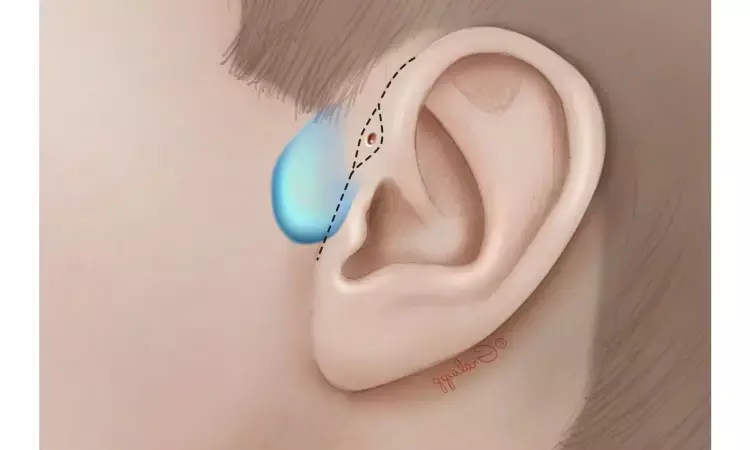- Home
- Medical news & Guidelines
- Anesthesiology
- Cardiology and CTVS
- Critical Care
- Dentistry
- Dermatology
- Diabetes and Endocrinology
- ENT
- Gastroenterology
- Medicine
- Nephrology
- Neurology
- Obstretics-Gynaecology
- Oncology
- Ophthalmology
- Orthopaedics
- Pediatrics-Neonatology
- Psychiatry
- Pulmonology
- Radiology
- Surgery
- Urology
- Laboratory Medicine
- Diet
- Nursing
- Paramedical
- Physiotherapy
- Health news
- Fact Check
- Bone Health Fact Check
- Brain Health Fact Check
- Cancer Related Fact Check
- Child Care Fact Check
- Dental and oral health fact check
- Diabetes and metabolic health fact check
- Diet and Nutrition Fact Check
- Eye and ENT Care Fact Check
- Fitness fact check
- Gut health fact check
- Heart health fact check
- Kidney health fact check
- Medical education fact check
- Men's health fact check
- Respiratory fact check
- Skin and hair care fact check
- Vaccine and Immunization fact check
- Women's health fact check
- AYUSH
- State News
- Andaman and Nicobar Islands
- Andhra Pradesh
- Arunachal Pradesh
- Assam
- Bihar
- Chandigarh
- Chattisgarh
- Dadra and Nagar Haveli
- Daman and Diu
- Delhi
- Goa
- Gujarat
- Haryana
- Himachal Pradesh
- Jammu & Kashmir
- Jharkhand
- Karnataka
- Kerala
- Ladakh
- Lakshadweep
- Madhya Pradesh
- Maharashtra
- Manipur
- Meghalaya
- Mizoram
- Nagaland
- Odisha
- Puducherry
- Punjab
- Rajasthan
- Sikkim
- Tamil Nadu
- Telangana
- Tripura
- Uttar Pradesh
- Uttrakhand
- West Bengal
- Medical Education
- Industry
Surgical strategy not important- Magnifying equipment use during preauricular fistula surgery may diminish recurrence rate

China: A 12-year single-centre clinical observation revealed no significant impact of the partial removal of the cartilage of the pedicle, use of methylene blue, and surgical incision during preauricular fistula resection on postoperative suture removal time, operative duration, and postoperative recurrence rate.
The researchers in their study published in BMC Surgery, therefore, suggest that surgeons can select their preferred approaches based on patient-specific situations and their practices. However, the use of magnifying equipment during surgery is associated with a reduced risk of recurrence.
Congenital preauricular fistula refers to a congenital malformation observed in the field of otolaryngology. Surgery remains the most effective method of treatment for complex preauricular fistulas that are susceptible to infection and pose challenges in complete removal during surgery, leading to a high postoperative recurrence rate. Currently, the recurrence after preauricular fistula resection is a considerable clinical concern. To address this concern, the identification of an effective method is required to reduce the risk of recurrence by selecting appropriate surgical techniques.
Therefore, to enhance the clinical knowledge and contribute to strategies for reducing recurrence, Xianhai Zeng, Institute of E.N.T Shenzhen, Longgang E.N.T Hospital, Guangdong Province, People’s Republic of China, and colleagues aimed to assess the effects of surgical timing and approach for preauricular fistula on the postoperative suture removal time, operative duration, and postoperative recurrence rate. To analyze the potential effects of different surgical strategies on these critical outcomes, a 12-year single-centre clinical observation was conducted.
In the retrospective study, the researchers examined clinical data from 576 (782 ears) patients who underwent surgical resection for preauricular fistulas. Based on differences in surgical techniques, operative duration, and the use of intraoperative magnifying equipment, the patients were classified into several groups. Furthermore, the specific data on operative duration postoperative recurrence rate, and postoperative suture removal time were also recorded.
The study led to the following findings:
- The average operative duration for 782 ears and the average time required for postoperative suture removal were determined to be (34.57 ± 4.25) min and (3.62 ± 0.76) days, respectively.
- Among the cases examined, recurrence occurred in 13 ears, but all of them were cured after a second surgery, resulting in a recurrence rate of 1.67%.
- The operative and postoperative suture removal time was prolonged during the infection period.
- The postoperative recurrence rate was significantly higher in the absence of magnifying equipment, as compared to those with the use of a microscope with 2.5× magnification.
- No statistically significant differences were noted in the recurrence rate when comparing different anaesthesia methods and surgical incision types, as well as the intraoperative use of methylene blue, and partial removal of cartilage of the pedicle.
"The use of magnifying equipment during surgery has shown the potential to diminish the recurrence rate, underscoring its clinical utility as an adjunctive tool to enhance surgical outcomes," the researchers concluded.
Reference:
Li, K., Hao, Y., Zhao, J. et al. Surgical treatment of preauricular fistulas: a 12-year single-center clinical observation. BMC Surg 23, 297 (2023). https://doi.org/10.1186/s12893-023-02198-x
Dr Kamal Kant Kohli-MBBS, DTCD- a chest specialist with more than 30 years of practice and a flair for writing clinical articles, Dr Kamal Kant Kohli joined Medical Dialogues as a Chief Editor of Medical News. Besides writing articles, as an editor, he proofreads and verifies all the medical content published on Medical Dialogues including those coming from journals, studies,medical conferences,guidelines etc. Email: drkohli@medicaldialogues.in. Contact no. 011-43720751


